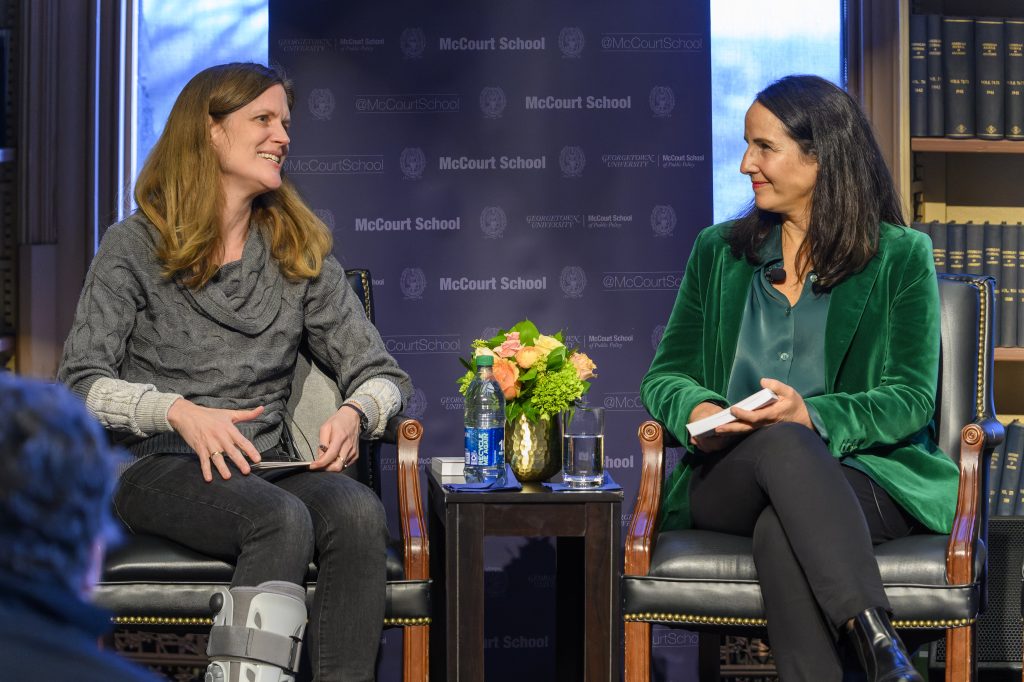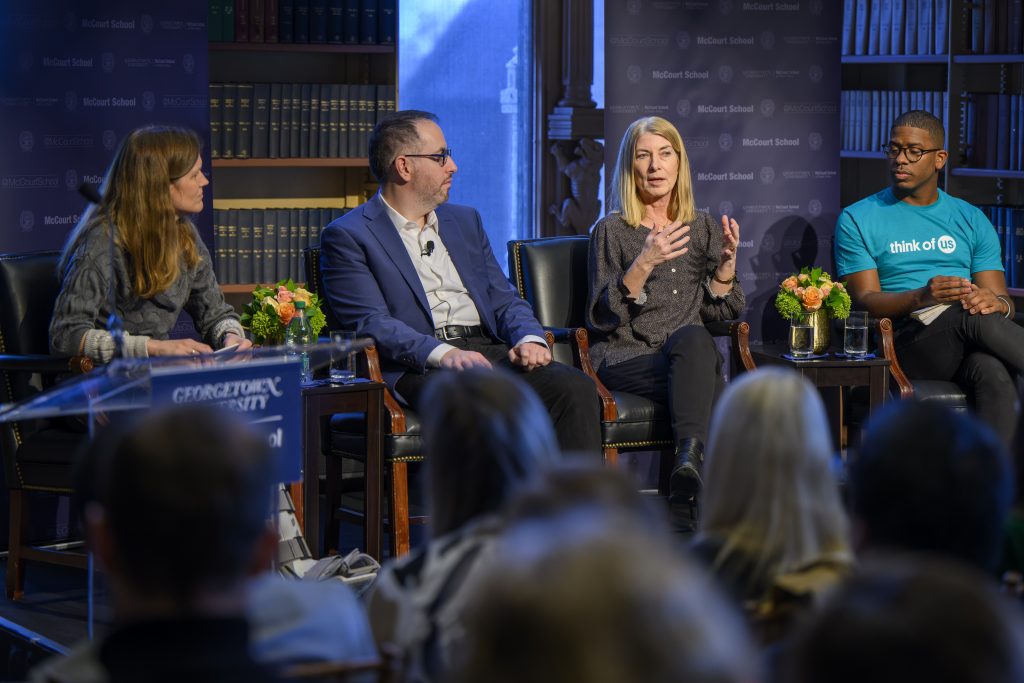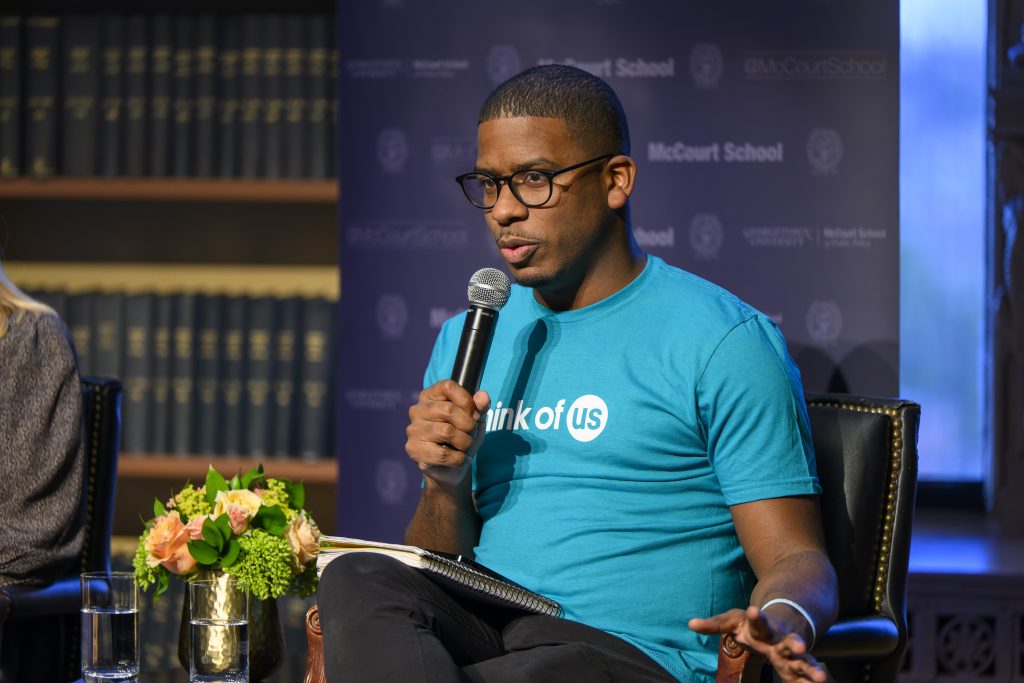McCourt School hosts award-winning changemakers and social entrepreneurs
Members of the Georgetown University community joined Ashoka and McCourt Global to celebrate the launch of America’s Path Forward: Conversations with Social Innovators on the Power of Communities Everywhere.
The McCourt School of Public Policy, Ashoka, an international organization dedicated to promoting social entrepreneurship, and McCourt Global’s Unfinished initiative, and the Unfinished Network, welcomed more than 100 guests to Georgetown University’s Riggs Library to celebrate the launch of America’s Path Forward: Conversations with Social Innovators on the Power of Communities Everywhere, a collection of interviews with 22 award-winning changemakers and social entrepreneurs with decades of experience working in communities across America.

Konstanze Frischen (left) and Paula Recart (right) speak in Riggs Library
Following an introduction by GU Politics Director Mo Elleithee, McCourt Global’s Chief Impact Officer Paula Recart joined Konstanze Frischen, a member of Ashoka’s Global Leadership group, for a conversation about driving progress in an impactful way.

Panel discussion at Riggs Library
Frischen was then joined on stage by three Ashoka Fellows featured in the book, Sixto Cancel, Albert Fox Cahn and Rosanne Haggerty, for a discussion about their experiences redesigning child welfare, tackling homelessness and defending privacy in the digital age.
Cancel, who grew up in, and aged out of, the child welfare system, spoke about his lived experience and its role in founding his organization, Think of Us. Cancel stressed the importance of needs-based data collection which focuses on people rather than policy effectiveness. He went on to share a recent triumph in compiling data for youth in the child welfare system, leading to “0 million being provided to states…which put direct cash in young people’s pockets and started making a difference immediately.”
The “evidence of the policy’s effectiveness was so clear that it superseded the political ideologies of the audiences,” he said, adding that “it allowed impactful change to be made.”
Cancel encouraged aspiring policymakers to work in areas about which they are passionate. “Even if it seems niche, you make the most change when you are intimately familiar with what needs to happen and where progress needs to be made,” he said.

Sixto Cancel speaking at Ashoka event in Riggs Library
Frischen then turned to Rosanne Haggerty, president and founder of Community Solutions and its Built for Zero network. Haggerty and her organization take an evidence-based approach to addressing homelessness in America and have found that “communities across the country are made up of well-intentioned people working to comply with whatever it is that their governance structure dictates, rather than using data to solve the problem.”
After analyzing the population data and working closely with people experiencing homelessness, they found that creating systems that provide secure housing facilities and job training can decrease homelessness significantly.
If you take an evidence-based, data-driven approach and redesign the system to focus on the task of ending homelessness, rather than compliance to arbitrary rules, there actually could be an end in sight for the unhoused population in this country.”
Rosanne Haggerty
Albert Fox Cahn, founder and executive director of the Surveillance Technology Oversight Project (STOP) and a fellow at Yale Law School’s Information Society Project, then shared what he’s learned over his decades-long career as a lawyer and activist. “Current privacy policies created during the time of analog models have failed to keep up with the digitization and advancements in technology,” he said.
Fox Cahn encouraged students at Georgetown to continue to stand up for what they believe in and to “work to advance privacy policies that protect the people they have long victimized.”
Read more about America’s Path Forward: Conversations with Social Innovators on the Power of Communities Everywhere.
- Tagged
- Tech & Public Policy
